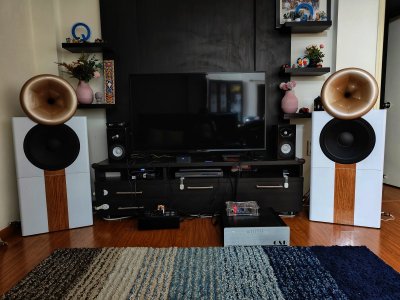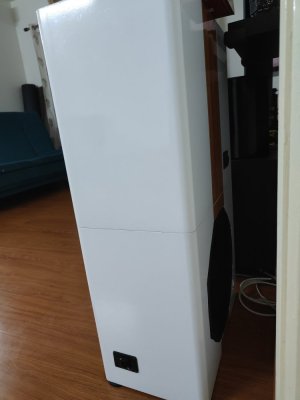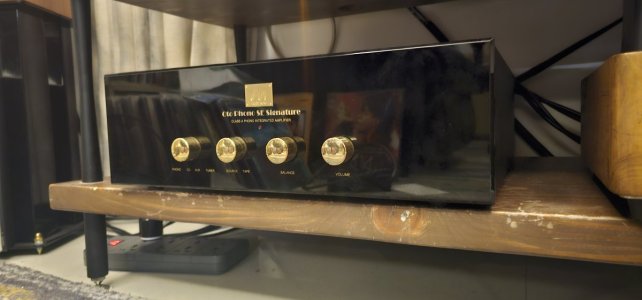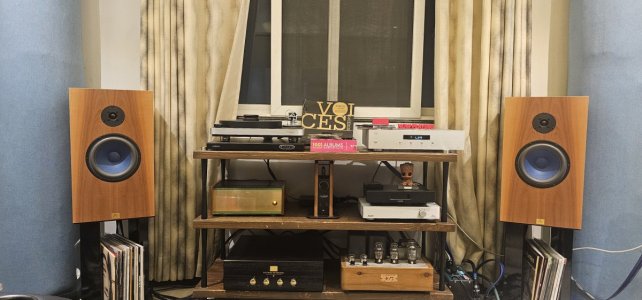It’s the same as what I have said . Just different verbiage ! You may have to read it againI beg to disagree here. Real audiophile grade products are not at all flashy, they are raw, crude like Bryston, Naim, Cyrus no frill amps without bass and treble. These brands concentrate only music to the ears, and not to please the eyes.
Stereo HiFi Rig: Cambridge Audio Cxn v2 + Cyrus6 / Elekit tu 8730 300b + ASI Live line power cable + ASI Live line Reference IC + Townsend Isolda speaker cables + Linn Keilidh speakers
You are using an out of date browser. It may not display this or other websites correctly.
You should upgrade or use an alternative browser.
You should upgrade or use an alternative browser.
Showcase your audio/video setup here!......
- Thread starter Anil kumar
- Start date
In my audio experience (i think most would relate), 98% of things that are flashy and have unique aesthetic value, mostly will be about frills and end up compromising on the sound. Rose belongs to the rare 2% which backs the aesthetics with real quality sound.
+ Sounds Exceptionally Open and Transparent (heard it along side Lumin U2 and Aurender N200)
+ Remarkable openess in the higher end; Damn quiet as well !
+ Plays anything and everything (including its custom Ad free implementation of you tube)
+ Fiberoptic Ethernet port and Fiberoptic USB (Needs an adaptor device)
+ i2S Support
+ Amazing and Responsive Touch Screen with 4k HDMI out to Projectors or Bigger screen
+ Eye candy even when switched off
- Frustrating App (No where near aurendner's class)
- i2S implementation is limited and applicable only to specific DACs
- They tried to make a Social community approach baked in the App which feels like shooting in the dark without purpose
- Unusual screen size ends up being wasted in most videos; Album art and artist name display looks amazing though!
Please share your thoughts on the sonic comparison between the RS130, U2, and N200, leaving aesthetics aside and focusing solely on sound quality.
I recently moved from N200 to U2, for AES/EBU.
Vineethkumar01
Well-Known Member
Please share your thoughts on the sonic comparison between the RS130, U2, and N200, leaving aesthetics aside and focusing solely on sound quality.
I recently moved from N200 to U2, for AES/EBU.
U2 was very good too ! Had superb bold sound, great soundstage and crisp bass. Infact the U2 had a biggest and widest imaging when compared to the other two.
I felt the N200 was slightly down on dynamics over U2 and RS130. It had great mid range and maybe more natural bass.
RS130 the mid and highs were totally outstanding, literally they opened up the soundstage vertically.
In my opinion (in the several tracks i heard), the N200 felt half a notch below both U2 and RS130. Not that N200 is bad, but there was some magic missing in it, which was found in varying degrees in U2 and RS130.
Other Equipment Details:
DAC: Ferrum Wandala Golden Sound + Ferrum LPSU
Amp: Goldmund Dual Mono Int
Speakers: ATC SCM40
Cables: VDH (not sure of model)
Isolation: Finte Element Cera Base
@thedude I am currently using just the USB for connecting DAC, any specific reason for AES/EBU connection ? is it superior ?
Are you using the allo amp to drive this or the O&B amp. What model is the O&B amp?My new DIY controlled directivity 3 way system
Speaker front side showing 15inch midbass + CD horn
View attachment 87638
Speaker backside showing the 15 inch subwoofer
View attachment 87639
reignofchaos
Well-Known Member
amrutmhatre90
Well-Known Member
My new DIY controlled directivity 3 way system
Speaker front side showing 15inch midbass + CD horn
Speaker backside showing the 15 inch subwoofer
Wow these look stunning!!!
Can you create a thread and share build details.
Vineethkumar01
Well-Known Member
This is a dsp crossover based 3way system. The allo amp drives the compression drivers (for now). The custom O&B 6 channel amp drives two of the 15 inch woofers and subwoofers.. Minidsp flex 8 implements the crossoverAre you using the allo amp to drive this or the O&B amp. What model is the O&B amp?
Last edited:
Vineethkumar01
Well-Known Member
Its all hereWow these look stunning!!!
Can you create a thread and share build details.
Thanks for sharing your thoughts—well articulated.U2 was very good too ! Had superb bold sound, great soundstage and crisp bass. Infact the U2 had a biggest and widest imaging when compared to the other two.
I felt the N200 was slightly down on dynamics over U2 and RS130. It had great mid range and maybe more natural bass.
RS130 the mid and highs were totally outstanding, literally they opened up the soundstage vertically.
In my opinion (in the several tracks i heard), the N200 felt half a notch below both U2 and RS130. Not that N200 is bad, but there was some magic missing in it, which was found in varying degrees in U2 and RS130.
Other Equipment Details:
DAC: Ferrum Wandala Golden Sound + Ferrum LPSU
Amp: Goldmund Dual Mono Int
Speakers: ATC SCM40
Cables: VDH (not sure of model)
Isolation: Finte Element Cera Base
@thedude I am currently using just the USB for connecting DAC, any specific reason for AES/EBU connection ? is it superior ?
I recently tried a couple of DACs: the Berkeley Alpha and a Meitner. Both offered a presentation over AES that I preferred for the direction I wanted to take, vs USB. The cables I used were a Synergistic Research powered USB, Audioquest Diamond USB, and Studio Connections AES.
I have a good collection of DSDs, and AES won’t handle DSD—but I would still stick with AES.
Details of the rest of the chain are in my signature.
Yelamanchili manohar
Well-Known Member
U2 was very good too ! Had superb bold sound, great soundstage and crisp bass. Infact the U2 had a biggest and widest imaging when compared to the other two.
I felt the N200 was slightly down on dynamics over U2 and RS130. It had great mid range and maybe more natural bass.
RS130 the mid and highs were totally outstanding, literally they opened up the soundstage vertically.
In my opinion (in the several tracks i heard), the N200 felt half a notch below both U2 and RS130. Not that N200 is bad, but there was some magic missing in it, which was found in varying degrees in U2 and RS130.
Other Equipment Details:
DAC: Ferrum Wandala Golden Sound + Ferrum LPSU
Amp: Goldmund Dual Mono Int
Speakers: ATC SCM40
Cables: VDH (not sure of model)
Isolation: Finte Element Cera Base
@thedude I am currently using just the USB for connecting DAC, any specific reason for AES/EBU connection ? is it superior ?
Thanks for sharing
I've always loved the looks of the Rose RS130. And have been reading high praise about its sound quality too. Since you are using a gustard R26 with clock input. And the RS130 already has clock input, please try getting hold of a 10Mhz clock and two 50 ohm BNC clock cables and sync both the R26 and RS130 to an external master clock and see. In this configuration, you should connect the RS130 to the R26 via Spdif inputs, which are Aes-Ebu, Coaxial, or optical. With Aes-Ebu most times being the best. This is the 2nd best way of connecting the RS130 to the R26 if you have a clock, otherwise I2S is the usually most preferred method.
Yelamanchili manohar
Well-Known Member
The speakers look beautifulThis is a dsp crossover based 3way system. The allo amp drives the compression drivers (for now). The custom O&B 6 channel amp drives two of the 15 inch woofers and subwoofers.. Minidsp flex 8 implements the crossover
Coming to the crossover, is it loaded into the internal convolution engine of the Flex 8, or are you using it as only a multi-channel dac with the digital crossover done digitally in some software on a PC. Describing your crossover implementation either here, or in a separate thread will be very helpful for aspiring digital converts like myself.
I have been thinkng about getting a 8 channel dac, and curious about the Flex 8. Iam new to all this and been trying to learn as much as possible. The idea is to end up with FIR crossovers designed mostly in Audiolense. Have your goodselves tried something like these audiolense or accurate softwares, though they might not be always needed I guess.
Vineethkumar01
Well-Known Member
Actually, as the number of boundaries increases, the gain also increases proportionally. I will write more details about it probably in my thread.The speakers look beautiful. I was following your build thread, and the idea of using the 6db boundary re-inforcement at the lower bass, was a very neat trick. I noted it down, for my future use

I use the DSP capability of the Minidsp Flex 8 to the full extent and not only its DAC. The FIR capabilities of the Flex 8 are rather limited since FIR filter capabilities are only available at the inputs and not on the outputs. This makes it limited to only handling room EQ sort of stuff with FIR.Coming to the crossover, is it loaded into the internal convolution engine of the Flex 8, or are you using it as only a multi-channel dac with the digital crossover done digitally in some software on a PC. Describing your crossover implementation either here, or in a separate thread will be very helpful for aspiring digital converts like myself.
However, in this aspect, the Minidsp flex also can use FIR filters on its output also thereby enabling one to implement FIR filters in crossover. But again, the number of taps is rather limited.
From an absolute performance point of view (in terms of numbers), a DSP solution involving a multichannel DAC like Octo DAC8 pro + a single board computer (eg: raspberry pi)/fanless PC might offer best performance (eg: https://www.audiosciencereview.com/forum/index.php?threads/rpi-camilladsp-tutorial.29656/). This is because it can run full bandwidth FIR filtering on all channels. Earlier I used to run 64000 tap FIR filters on each of the 6 channels of my 3way active system. The Octo DAC 8 pro is one of the best solutions to go with an audiolense/accourate softwares-based set up I think.I have been thinkng about getting a 8 channel dac, and curious about the Flex 8. Iam new to all this and been trying to learn as much as possible. The idea is to end up with FIR crossovers designed mostly in Audiolense. Have your goodselves tried something like these audiolense or accurate softwares, though they might not be always needed I guess.
The Minidsp models don't even come close in terms of sheer capabilities from that point of view. However, in terms of set-up and user-friendliness, at the moment, the Mindsp is good. I like it.
Other very capable DSP solutions include this: https://danvillesignal.com/dspnexus-dsp-audio-processor
I am not thinking about DeQX because of its cost.
Yelamanchili manohar
Well-Known Member
Thanks a ton for sharing. Much appreciatedActually, as the number of boundaries increases, the gain also increases proportionally. I will write more details about it probably in my thread.
I use the DSP capability of the Minidsp Flex 8 to the full extent and not only its DAC. The FIR capabilities of the Flex 8 are rather limited since FIR filter capabilities are only available at the inputs and not on the outputs. This makes it limited to only handling room EQ sort of stuff with FIR.
However, in this aspect, the Minidsp flex also can use FIR filters on its output also thereby enabling one to implement FIR filters in crossover. But again, the number of taps is rather limited.
From an absolute performance point of view (in terms of numbers), a DSP solution involving a multichannel DAC like Octo DAC8 pro + a single board computer (eg: raspberry pi)/fanless PC might offer best performance (eg: https://www.audiosciencereview.com/forum/index.php?threads/rpi-camilladsp-tutorial.29656/). This is because it can run full bandwidth FIR filtering on all channels. Earlier I used to run 64000 tap FIR filters on each of the 6 channels of my 3way active system. The Octo DAC 8 pro is one of the best solutions to go with an audiolense/accourate softwares-based set up I think.
The Minidsp models don't even come close in terms of sheer capabilities from that point of view. However, in terms of set-up and user-friendliness, at the moment, the Mindsp is good. I like it.
Other very capable DSP solutions include this: https://danvillesignal.com/dspnexus-dsp-audio-processor
I am not thinking about DeQX because of its cost.
I spent a few hours only yesterday reading up on Acourate. And to say I was lost, would be an under statement
captainsubtext
Active Member
Full audionote system incoming!Locked into the synergy of an AN chain , upgraded my amp to OTO Phono SE Signature. The EL84 implementation is just magical , in love with these.
View attachment 87830View attachment 87831
One at a time for obvious reasonsFull audionote system incoming!
mahaaprasaad
Well-Known Member
One life is not enough.............
Stumbled on YouTube and wondering if the gentleman who owns this is on this forum. This is perfect retirement for me.
A beautiful, well-constructed speaker with class-leading soundstage, imaging and bass that is fast, deep, and precise.
Similar threads
- Replies
- 40
- Views
- 47K
- Replies
- 23
- Views
- 8K





